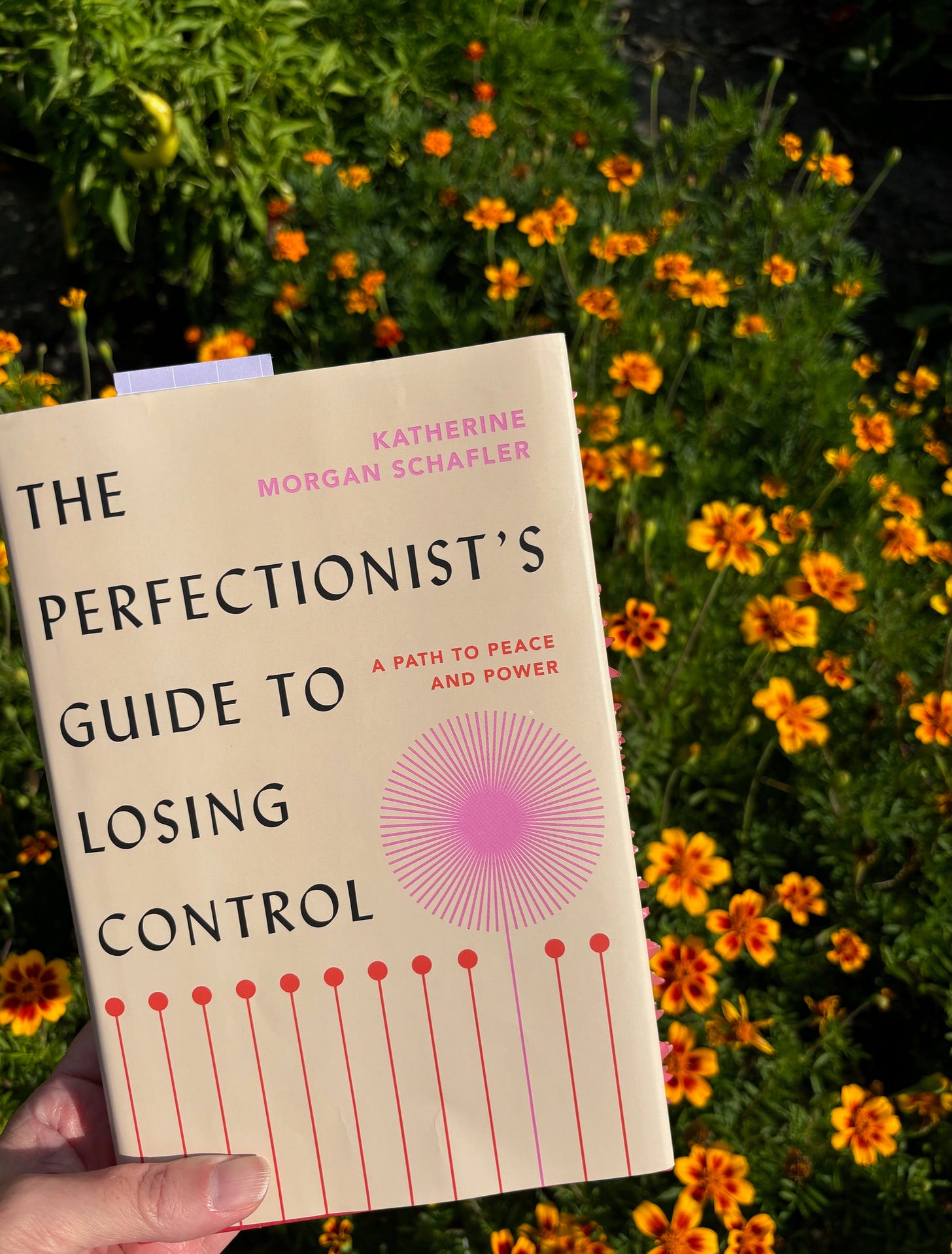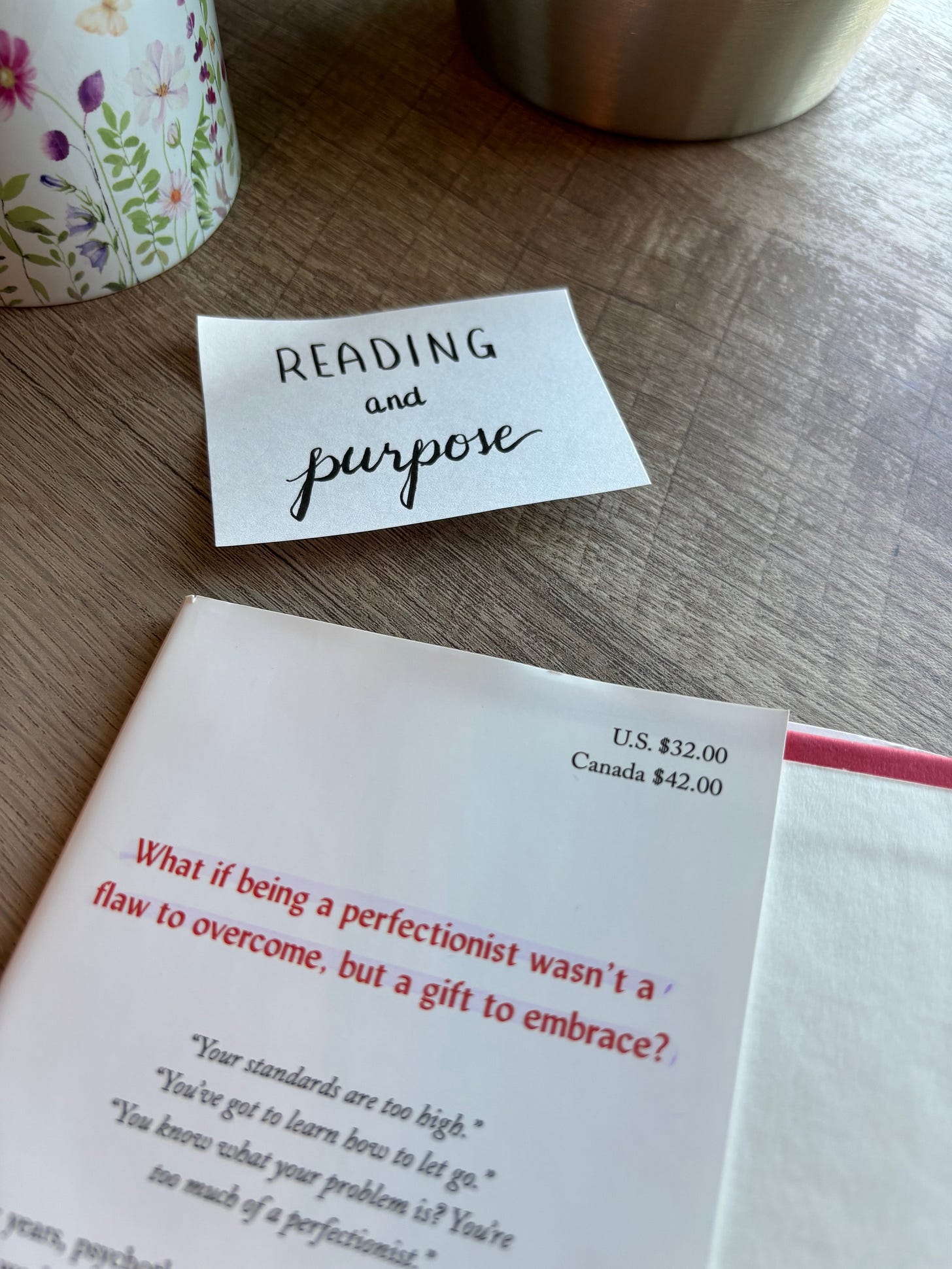A Reading Guide For The Perfectionist's Guide
Points to ponder while (or after) you read The Perfectionist's Guide To Losing Control.
At the start of the year, I didn’t know this book existed. For the past six months, however, a week hasn’t passed without me mentioning it, recommending it, posting about it on social media, rereading portions of it, or otherwise fan-girling over it!
A Bit Of Background
Normally, my ‘history’ with a book doesn’t seem too unique or out of the ordinary: someone recommends a title to me or I hear a description on a podcast, I add it to my TBR and/or put it on hold at the library, and we go from there. My relationship with The Perfectionist’s Guide To Losing Control by Katherine Morgan Schafler began a bit differently, however: I saw the title mentioned in the comment section of a random something somewhere (that’s about as much detail as I remember!) and thought, ‘I’m intrigued.’ Later that day, I picked it up from my library - but knew within a few pages that I needed to highlight, tab, and write in the margins. I saw that Dog-Eared Books in Ames, IA had a copy, and I drove up the next day and purchased it - in the meantime using one of my LibroFM credits to listen to it, too! I devoured it within a matter of days and have referred back to it countless times since.
To say this book spoke to me is an understatement. I even highlighted the inside front cover! (Who does that??)
A Few Thoughts Before We Dive In
Even if you don’t consider yourself a perfectionist per se, consider giving this book a try. In my opinion, you could replace the term ‘perfectionist’ in the title with any number of alternatives: Achiever, hard worker, someone ambitious or goal-oriented or driven, for instance. Even someone with simply a desire to succeed could relate to the points offered within the book.
Personally, for example, I don’t tend to refer to myself as a perfectionist, although I do have perfectionistic tendencies in a few areas (mostly related to my work). I do, however, connect with ‘achiever’ and ‘ambitious’ and some of those other terms, and this book obviously resonated with me tremendously!
Regardless, if you relate to any of these or similar words, I believe you’ll find value in this book.
I won’t write a full review just yet - though stay tuned, because that’s definitely on the horizon. But since I will be discussing this in a couple of book club settings in the near future, and since I’ve recommended it to so many clients and friends, I thought I’d offer some questions/prompts for you to reflect on as you read or when you finish.
And if you’re attending one of the upcoming book discussions, we may address some of these prompts there as well!
Reading / Reflection Prompts
In addition to your own notes and highlights, consider these reflection prompts while or after (or in some cases, even before, if you wish!) you read The Perfectionist’s Guide To Losing Control by Katherine Morgan Schafler.
What comes to mind when you think of ‘perfectionism’?
Do you resonate with the label ‘perfectionist’ or feel that you have perfectionist tendencies? How has this shown up in your life?
How has perfectionism gotten in your way?
On the flip side, how has perfectionism benefited you? Or how might it benefit you?
If you took the ‘Which Type of Perfectionist Are You?’ quiz, which one did you land on? How much do you relate to it?
Early in the book, Schafler discusses how there is no agreed-upon definition of perfectionism in the field of mental health. What kind of impact do you think this lack of definition has made over the years? How would you define perfectionism, based on your own readings, experiences, and/or conversations?
In the section titled, ‘Think Outside The Box, Then Throw The Box Away,’ Schafler offers perspective shifts around perfectionism - such as no longer calling yourself a ‘recovering perfectionist’ (there’s nothing to ‘recover’ from), and starting to appreciate and embrace how your drive has positively served you. How do these shifts land with you? Do they feel affirming? Exciting? Impossible? Something else?
How does learning about adaptive and maladaptive perfectionism impact your thoughts around perfectionism in general?
The book touches on so many topics in related, relatable ways - such as compassion, reframing, trust, overthinking, and more. What stands out for you? Has reading about it in this manner prompted you to think differently?
In chapter 6, the author talks about learning to honor the process rather than just the end result when it comes to goals, projects, and the like. She gives an example from her own life, when she held a ‘trying party’ and engaged her daughter in the activity as well. What do you think about this? How could we truly embrace the idea of ‘celebrating the journey’ and not just the outcome?
Chapter 8 offers a variety of word/phrase replacements to help us think differently. For example, instead of ‘I don’t know what I want,’ try ‘I’m reimagining what’s possible for myself,’ or instead of ‘I’m sorry I’m such a mess,’ try ‘Thanks for your patience with me.’ What’s a word or phrase you use routinely - perhaps only in your own mind - that doesn’t serve you well? How might you replace it?
Personally, this book made laugh out loud, cry actual tears, and pretty much feel the gamut of emotions - which I can’t say is always (or even usually) the case for a nonfiction personal development book. What did you experience while reading? What are your top takeaways? To whom would you recommend this book?
Feel free to add your prompts, thoughts, or reading experiences in the comments below! And if you’re in Iowa and want to join the book discussion on Oct 23, check out Dog-Eared Books’ website (under Your Best Self Book Club) or contact me for details - I’d love to see you there!




